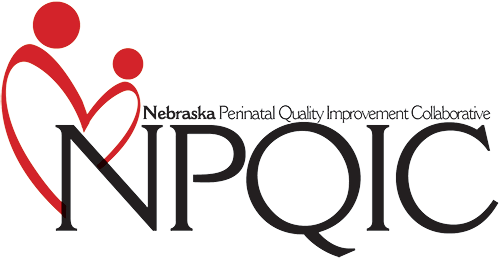Substance use disorders (SUDs) during pregnancy contribute significantly to maternal morbidity and mortality in the United States. In Nebraska (NE), SUDs contributed to one in five pregnancy-associated deaths between 2017-2021. In their most recent report (2023), the NE Maternal Mortality Review Committee (MMRC) recommended substance use disorder screening, referral, and plan of safe care and substance abuse identification, treatment, and follow-up as actionable strategies to reduce preventable maternal mortality.
Perinatal Substance Use
Addressing Perinatal Substance Use in Nebraska
Despite recommendations from the Nebraska Maternal Mortality Review Committee for SUD screening and treatment, challenges persist. These include inconsistent screening protocols, varied understanding and implementation of federal CARA and CAPTA requirements, and inconsistent use of Plans of Safe Care (POSC). Unfair practices disproportionately affect Black, Indigenous, and People of Color (BIPOC) populations, and fear of child protective services involvement deters women from seeking help. Rural areas face additional barriers due to limited resources and expertise. The lack of standardized, balanced care practices not only affects individual health outcomes but also perpetuates systemic differences in maternal and infant healthcare across the state.
In 2024, NPQIC launched a targeted initiative to address substance use disorders (SUDs) during pregnancy, supported by the CDC-RFA-DP22-2207 Statewide Perinatal Quality Collaboratives cooperative agreement. This project aimed to tackle the significant contribution of SUDs to maternal morbidity and mortality in Nebraska.
NPQIC began with a comprehensive baseline assessment of all birthing facilities in Nebraska, revealing significant gaps in policies and practices related to perinatal substance use care. Based on these findings, NPQIC is implementing a multi-faceted strategy:
- An educational initiative featuring a webinar series on key topics in perinatal SUD care.
- Development of Nebraska-specific resources to support healthcare facilities in implementing best practices.
- Ongoing support to facilitate the adoption of evidence-based protocols, improve standardized care, and promote best practices across the state.
State Resources
Nebraska DHHS: Comprehensive Addiction and Recovery Act (CARA)
- CARA Letter to Nebraska Hospitals, (3/2024)
Nebraska DHHS: Drug Overdose Prevention-Naloxone
Referral Resources
Nebraska Resource and Referral Network
Nebraska Network of Care for Behavioral Health
Wellbeing Initiative, Nebraska Statewide Resource Directory
- Search for mental health and substance use resources in Nebraska
- Includes Postpartum Support International- Nebraska resources
National Resources
Colorado
- CPCQC
- CHoSEN
- SuPPoRT Colorado
- MOMs+
- Field Guide to Addressing Perinatal Substance Use in Colorado, January 2026
California
National Harm Reduction Coalition and Academy of Perinatal Harm Reduction
SAMHSA-Substance Abuse and Mental Health Services Administration
If, When, How Lawyering for Reproductive Justice
Momma's Voices
Karna Maternal Health Advisory Network (MHAN)
National Institute on Drug Abuse
Weitzman Institute
- Supporting Perinatal Patients with Substance Use Disorder
- Free education modules with credits
Literature
Advances, Nuances, and Future Directions in Neonatal Toxicology Testing, Gold et.al. 2024
What Can a Urine Drug Screening Immunoassay Really Tell Us?, Nelson et.al., 2016
Substance Use Screening and Toxicology Policy Recommendations Webinar
SUD Webinar Series
- Session 1: CAPTA, CARA, and NE Plan of Safe Care (4/22/24)
- Available for 1.0 CME, DEA MATE, and Opioid Prescriber Credit until April 22nd, 2026
- Session 2: Turning the Tide: Helping Mothers with Addiction (5/6/24)
- Available for 1.0 CME, DEA MATE, and Opioid Prescriber Credit until May 5th, 2026
- Session 3: Evidence-informed Hospital Policy for Perinatal Substance Use and Toxicology Testing (6/10/24)
- Available for 1.0 CME, DEA MATE, and Opioid Prescriber Credit until June 10th, 2026
- Session 4: Stigma and Bias in the Care for Patients with Perinatal Substance Use Disorders (8/12/24)
- Available for 1.0 CME, DEA MATE, and Opioid Prescriber Credit until August 12th, 2026
Webinar Series FAQs: Supporting Families with Perinatal Substance Use
A Critical Examination of Neonatal Opioid Exposure in Rural Nebraska
Opioid exposure during pregnancy is an increasingly common problem in the United States. In Nebraska, maternal opioid use varies significantly across regions. Early diagnosis of Neonatal Opioid Withdrawal Syndrome (NOWS) before hospital discharge is crucial for reducing mortality in this high-risk population.
NPQICs Maternal Infant Health Opioid Pilot Project critically examined the incidence of neonatal opioid exposure in rural Nebraska. The project focused on two main objectives.
- Educating health care providers and medication dispensaries regarding opioid prescription use in pregnancy
- Enhancing primary care providers to implement therapeutic interventions that can improve the health outcomes of families affected by prenatal opioid exposure.
In partnership with the Academy of Pediatrics (AAP), NPQIC also developed an ECHO series to support pediatric primary care practices by raising awareness of prenatal opioid exposure, providing family-focused anticipatory guidance, and enhancing care for affected families.
Project Impact: Our interventions have demonstrated significant outcomes across Nebraska, particularly in high-risk rural areas. Statewide, we observed a decrease in prenatal opioid prescription rates from 4.1% to 2.4%. Concurrently, post-intervention NOWS diagnoses increased by 29% across all regions and counties.
Acknowledgment: This project was made possible by support from the Nebraska Tobacco Settlement Biomedical Research Development Fund (NTSBRDF), the UNMC Office of the Vice Chancellor for Research, and the Rural Drug Addiction Research (RDAR) Center (COBRE: P20GM130461).
Resources
Opioid Use Disorders: Interventions for Community Pharmacists
NPQIC Opioid Prescriptions in Pregnancy Webinar Handout (3/2023)
NEW RESEARCH NEJM: Eat, Sleep, Console Approach or Usual Care for Neonatal Opioid Withdrawal (4/2023)
Opioids in Pregnancy Posters
Webinar
- Opioid Prescriptions in Pregnancy, (3/22/2023)
- Available for 1.0 CME, DEA MATE, and Opioid Prescriber Credit until March 22nd, 2025
NPQIC/AAP Maternal Infant Health Opioid Use ECHO Series:
- Session 1: Neonatal Opioid Withdrawal Syndrome (NOWS) and the Eat Sleep Console (ESC) Model
- Session 2: Opioid Epidemic and the Pediatric Population
- Session 3: NOWS and Stigma: What is a Substance of "No-Choice”
- Session 4: The Role of CPS and the Hotline
- Session 5: Plans of Safe Care
- Session 6: Newborns with NOWS: Care After Discharge

